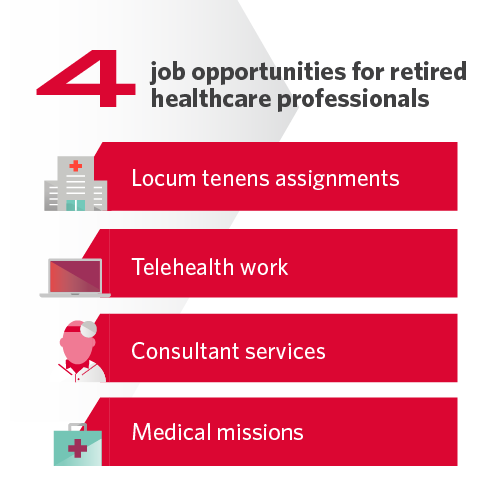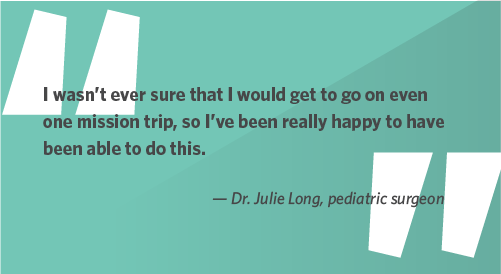After working for decades, you might be feeling ready to slow things down professionally — but what if you don’t want to stop practicing medicine entirely? Maybe you want more free time to pursue hobbies or visit family, but you know you have more to offer your patients. Or you don’t want to commit to a full-time schedule anymore, but you’d like to help underserved communities. Whatever your reasons, there are many ways to continue practicing medicine after retirement age. Here, we highlight four jobs for retired healthcare professionals that allow you to use your skills without a long-term commitment.

1. Ease into retirement with locum tenens
Many physicians take locum tenens assignments as a way to continue practicing while cutting back the number of hours they work. Locums allows you to control your schedule by only taking assignments that meet your requirements, whether that’s one weekend a month or every other week. In addition to schedule flexibility, locum tenens providers don’t have to deal with administrative or bureaucratic headaches. When you’re working, you can focus exclusively on patient care.
Locums also allows you to maintain an income stream. Nearly half (42%) of older physicians who work locum tenens do so to help increase their retirement funds, according to the 2023 Locum Tenens Awareness and Perception Survey, conducted by CHG Healthcare and Hanover Research. Locum tenens often pays higher hourly rates than staff positions, which can provide the income potential you seek even while working fewer hours.

Dr. Duane Webb, a gastroenterologist, recently retired from practice. But after three months, he was feeling restless and didn’t want to lose his clinical skills. So, he accepted a part-time locum tenens assignment with Weatherby Healthcare.
“It worked out very well,” he says, adding that he’s unlikely to go back to full-time retirement. In addition to continuing to treat patients, he says he appreciates “being able to tend to my garden, my yard, and possibly become a gentleman farmer in the weeks I have off. It’s a lot of fun.”
Locums can also introduce you to new parts of the country, different patient populations, and varied practice settings, giving you the chance to share your knowledge with new providers and underserved communities.
Dr. Julie Long, a pediatric surgeon, appreciates how working locums has allowed her to travel more easily and meet people from various backgrounds. “I can pick places where I might want to explore the area after I finish my assignment,” she says. “One of the best ways for me to meet people is to work with them, and then you really get a sense for what’s different about this part of the country versus that. It’s a really nice way to make a real connection to a community.”
Hear from one physician: Why locums makes sense for physicians nearing retirement
2. Practice from home via telemedicine
If you prefer to stay home while still being there for patients, telemedicine may be for you. After a sharp increase in utilization during the pandemic, this practice alternative is easier and more effective than ever. In fact, it’s been found to offer comparable outcomes to in-person doctor visits for certain forms of care.
That said, the practice of virtual medicine is still evolving. “The industry is still working through the best use cases for virtual physician care at the specialty level,” says Matt Brown, VP of telehealth at CHG Healthcare. “Some specialties and some patient visits simply make more sense than others for virtual care.”
For example, radiologists can offer provider-to-provider support; pathologists can provide diagnosis, education, and research from afar; cardiologists can look at electronically transmitted EKGs; and psychiatrists can speak to patients by phone or video chat.
If you pursue this line of work, look for healthcare organizations that offer technical, nursing, and administrative support. Make sure you’re in agreement with the volume of work you will be expected to handle and understand how you’ll be paid prior to starting.
No travel required: How locum tenens doctors care for patients close to home

3. Share your knowledge through consultant services
A wide variety of businesses rely on medical experts to guide them — from insurance companies and law firms to medical device manufacturers and healthcare facilities. As a medical consultant, you can share the knowledge you’ve amassed over your career while maintaining a flexible schedule and earning a good income.
Pinpoint your specific areas of expertise and how they could be applied in the marketplace. Maybe you’ve led an impactful committee, ran your own successful practice, or acted as medical director. Offer your services to people you already know and dedicate yourself to networking wherever possible, at meetings, conferences, and on social media sites like LinkedIn.
Dr. Theodore Ning retired from his urology practice after 20 years, but that doesn’t mean he stopped working. In addition to founding a nonprofit organization that does work internationally, he has also spent some time mentoring residents at a VA clinic. “I was doing what I’ve always done, which is basically staffing cases and being with the residents and helping them in clinics,” he says. While he started out as a volunteer, he was eventually paid on a per diem basis.
A primary care physician’s story: Continuing to practice in semi-retirement
4. Make a difference on a medical mission
Are medical missions on your bucket list? If so, now may be the perfect time to leave administrative duties behind and practice medicine at its most fundamental level. You can make a difference, see the world, and perhaps learn more about yourself, all at the same time.
Countless patients in under-resourced countries all over the world are desperate for medical care. Numerous reputable nonprofit organizations are dedicated to bringing healthcare volunteers to developing countries, and missions are available for varying time frames, from as brief as one week to as long as several months. In addition to treating patients, you can also make a difference by training local providers through continuing education workshops, lectures, and demonstrations.
Dr. Julie Long, a pediatric surgeon, was able to fulfill a long-held wish of going on medical missions after she began working locum tenens. Her flexible schedule gave her more options on timing and destination, and she’s traveled to Africa and South America on mission trips.
“I wasn’t ever sure that I would get to go on even one mission trip, so I’ve been really happy to have been able to do this,” she says. “It’s really nice to be able to still work but not work as many hours and not have as much responsibility but still do what I love.”

Making a difference: Physicians give back on a medical mission in Argentina
Retired healthcare professionals have plenty of job options
Whatever choice you make, rest assured that you can continue to practice medicine after retirement. In fact, you don’t need to make just one choice — you may prefer to dabble in several of the options listed above. For example, the flexibility of locum tenens work could allow you to go on a medical mission trip or accept consulting gigs. Or, you could accept locum tenens telehealth assignments and practice from home or a nearby clinic.
To learn more about working locum tenens, view today’s job opportunities or give us a call at 954.343.3050.